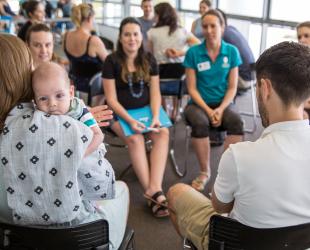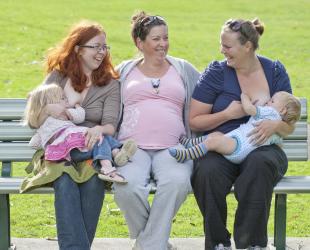Talking breastfeeding with special guest Dr Treasure McGuire
We know that breastmilk is just right for babies but what should mums eat? How can mums look after their own nutrition through pregnancy and breastfeeding and ensure their little one gets off to a great start in life? Andrea chats with Dr Treasure McGuire, a pharmacist with expertise in reproductive health, about the role of nutrients and nutrition in the first 1000 days of life.

Podcast episode
Podcast information
Talking breastfeeding with special guest Dr Treasure McGuire
We know that breastmilk is just right for babies but what should mums eat? How can mums look after their own nutrition through pregnancy and breastfeeding and ensure their little one gets off to a great start in life? Andrea chats with Dr Treasure McGuire, a pharmacist with expertise in reproductive health, about the role of nutrients and nutrition in the first 1000 days of life.
Information discussed in this episode:
- Breastmilk composition
- Breastfeeding and gastroenteritis
- How long should I breastfeed my baby?
- Breastfeeding and food sensitivities
- Looking after yourself
- How to contact Medicines Information Centres in your state
Credits:
This episode is presented by Andrea Wild. Featuring Dr Treasure McGuire.
Audio editing by Jessica Leonard. Show notes by Belinda Chambers. Transcription by Madina Hajher. Produced by Belinda Chambers, Jessica Leonard and Eleanor Kippen.
[Music fades into background]
TREASURE: I think the thing is don’t despair, this isn’t like ‘I stuffed it up on this one occasion so I’m going to feel guilty for the rest of my life because my baby hasn’t reached their potential’ - that’s not the case.
ANDREA: Welcome to Breastfeeding…with ABA, a podcast brought to you by volunteers with the Australian Breastfeeding Association. Breastfeeding…with ABA is a podcast about breastfeeding. It’s made by parents for parents. In this episode we’ll be talking about nutrition during the first 1000 days of life, from conception to around 2 years of age. In each episode you’ll hear from different mums from around Australia.
My name is Andrea Wild, I’m a volunteer breastfeeding counsellor with the Australian Breastfeeding Association and a mum of 2 boys. I am speaking from Canberra on the traditional lands of the Ngunnawal people. Breastfeeding…with ABA is recorded in different parts of Australia. We would like to acknowledge the traditional custodians of the lands on which we are recording and on which you are listening to this podcast. We pay our respects to elders past, present and emerging, and to all Aboriginal people who are listening to this today. We also acknowledge the long history of oral storytelling on this country, and the long history of women supporting each other to learn to feed their babies.
Today I’m talking to Dr Treasure McGuire - a pharmacist with expertise in reproductive health, she also advises on the safety of medicines during pregnancy and lactation. Today, Treasure is going to talk to us about nutrition for both mums and their babies. Hello and welcome Treasure.
TREASURE: Thanks very much for having me.
ANDREA: Thank you so much for joining us today. We’re recording this online; can you tell us about where you are recording from?
[Music fades out]
TREASURE: Okay well I’m physically sitting at my office at Bond University, School of Medicine, but I actually live at Cleveland in Queensland and that’s the home of the Quandamooka people who’ve been traditional owners of the area that’s now known as the Redlands Coast.
ANDREA: Wondering what to eat while pregnant and breastfeeding, and what to feed a growing baby or toddler is an almost universal experience for mothers, parents, and other caregivers. We know that breastmilk is just right for babies, but what should mums eat? How can mums look after their own nutrition and ensure their little one gets off to a great start in life? How can we navigate the different sources of information? Not to mention the delicious temptations! Why is it so important, anyway?
TREASURE: I think the importance of the first 1000 days has come into being, slowly, from about 50 years ago but more importantly in perhaps the last 2 decades. And the reason for that is that there was a natural experiment, an unfortunate experiment, and just the end of the second world war in war torn Europe where the Netherlands was under the German occupation, and they call this period the ‘Hungry Year’ or the ‘Hungry War’ because what we had in this environment was something that was quite unique. We had a previously well-nourished population, we had a relatively short period of famine, about 26-40 weeks, and we had excellent medical records that you may not see in a developing world. They studied over 2500 of the offspring of these women, when those offspring were in middle age, 50-58 years of age, and they broke this large population of consenting offspring into two groups. Those where mums were well rationed, and those that were exposed to essentially malnutrition over a 13-week period during their pregnancy. And we expected to see lower birth weights in the malnourished group, or the intervention group, what we didn’t expect to see was the high frequency of diabetes, cardiovascular disease, and what seems to have occurred is that the foetus was able to anticipate what they were going to experience in the real-world post-delivery, and program their epigenetic makeup accordingly.
ANDREA: Epigenetics – that’s an important concept here. It’s a branch of science that started around 30 years ago and it’s about looking at the genes you get from your parents combined with the environment you’re exposed to. So, picture a giant switchboard, every switch has a light bulb next to it and the switches are labelled – one says asthma, one says eczema, allergies, autoimmune diseases. To start with, most of the light switches are turned off, but the environment we’re exposed to can turn them on and off. So, in the ‘hungry war’ the malnutrition turned on some of the switches.
TREASURE: And by setting the switches in malnutrition, the foetus that becomes the infant is always trying to catch up. And hence the change in perspective in terms of diet and these adverse outcomes in later life, and it’s not just nutrition, it’s also the change in the diversity of our gut flora during the pregnancy, because the foetus takes on the microbiota from the mum. And what we know now is that if mum is poorly malnourished and has a dysbiosis in her microbiota, this primes the foetus, and then the infant and child in later life to a higher incidence of atopies like asthma, allergy, etc. So, it’s not surprising that this epigenetic role that is linked with nutrition and our microbiota, has become a really important area for research in the last decade. It’s not surprising then that the American Academy of Paediatrics has come out with a guideline that says, now that we know a lot more, we need just more than just saying ‘the woman needs a healthy diet’. We need to make sure that for the growing foetus, for importantly, their neurodevelopment, as well as other developmental needs, that there are specific nutrients, everything from zinc to protein, energy, that they’ve specified some of the key vitamins like D, A, to a smaller degree, the water soluble ones like vitamin B, are critical at the critical time points during pregnancy to promote whole sort of neurodevelopment.
ANDREA: So, it’s much more complicated than just feeding a good diet, or a healthy diet during pregnancy, there’s a really important relationship between a mum’s nutrition, and the infant’s later development. What can mums do to help their babies get off to a good start?
TREASURE: I think the first thing is remembering that we need to eat smart and by doing so eating large is not necessarily eating healthy. And there are the 5 food groups that we need, certainly a balanced diet, but there will be some women through lifestyle choice, through culture, through medical conditions, that may have special needs to fill some of those gaps during the period from conception to delivery. If I give you one example, folate, which is one of the common National Health and Medical Research Council recommendations for supplementation, not only in this country, but world-wide to prevent neural tube defects. The guideline says that we need between 30-120 days before conception to have adequate folate on board to replenish our intracellular stores. So, if you go into the pregnancy folate deficient, it is much, much harder to catch up in that critical period that’s going to follow. So, planning a pregnancy is not always possible, but when it is that’s a good start. I guess the important thing to understand is that we need those nutrients on board, particularly for neurodevelopment, from the moment of conception not four weeks later when you miss your last menstrual period, and you need them throughout, particularly the first trimester. This is when organogenesis, the individual organs, form. By simply adding folate to bread making flour, which is what’s happened in this country, we were able to drop the neural tube defect rate in Australia by 300 babies per year. And whilst that’s not a huge number, if you were one of the families that we’ve prevented from having a baby with a neural tube defect wouldn’t you be grateful for that?
ANDREA: Treasure I’d like to have a talk to you about microbiomes. I’m hearing more and more about our microbiome and how important it is to our health, to our mental health, how does the microbiome play into pregnancy?
TREASURE: I think we all know that in the 21st century there has been an increase in the prevalence of allergic disease. So, atopies such as allergy, asthma, eczema, and you have to ask yourself why? And it comes back to the fact that during pregnancy, the mother’s microbiome, this cluster of commensal bacteria, the good bacteria, change in both diversity and in numbers. And if you’ve got a healthy microbiome, it makes it very difficult for those pathogenic, those nasty bugs to grow. And the foetus takes on, through that passive diffusion across the placenta, much of the mother’s microbiome. Now, the problem is, and it’s like a double whammy, if you’ve got poor nutrition and you have a dysbiosis in your microbiome and what can cause that is physiological and psychosocial stress. And we live in a very stressful world. Very different to our grandparents. And so if you have these two in combination, what you’re doing is leading to an upregulation of some of the important immune cells like the T-2 helper cells that promote this atopy in later life. So, it’s not only important to keep our nutritional input healthy, but also to have a healthy microbiome. And relieving stress, trying to avoid scenarios where we can easily become infected, because women are very vulnerable in pregnancy to infection, are some good strategies to help in the process.
ANDREA: I remember having a horrific gastro courtesy of my 2-year-old when I was pregnant with my second son. So, if a mum has had an infectious diarrhoea or has taken antibiotics during her pregnancy, those things can disrupt the microbiome, what can a mum do nutrition wise to help improve her microbiome?
TREASURE: Twofold: we’ve got to make sure we get nutrition back on track with small amounts of nutrient frequently, rather than big loads of nutrient infrequently. So, you’re not going to sit down to a 3-course meal straight after having had some form of diarrhoea; you want little nutrient loads so we’re not hitting the gut too much. And in terms of the microbiota, it depends upon the cause; like this is a potential role for probiotics. And if it was antibacterial antibiotic induced, then you need a mixed probiotic with not only lactobacilli, the good bacteria, but you also need saccharomyces, some of the good fungal probiotics, because remember you’ve used some antibacterial antibiotic so that means you’ve potentially knocked off some of the very doses that you’re taking because there’s still a residual of the antibiotic there. If it’s infective but not antibiotic induced, then a broad range of lactobacilli of different species in the probiotic mix. We don’t have the optimal or the ideal probiotic individualised for every woman, because we don’t know what your microbiota looks like and you’re trying to restore as close as possible to what was normal for you. So, a broad-spectrum probiotic can be very beneficial in that circumstance.
ANDREA: When a baby is first born the mother produces colostrum, an early form of breastmilk, it contains substances that stimulate the immune system and help the infant’s gut to mature. Colostrum includes antibodies that help protect the baby from diseases. A mum who’s being careful about nutrition during her pregnancy has now given birth, she’s holding her little baby, what does she need to start thinking about to be getting adequate nutrition as she begins her breastfeeding journey?
TREASURE: To start with we have to think of the breastfed infant as a parasite, a good parasite [laughs] one that we love, but still a parasite! Who will suck the lifeblood out of us, the mum. And the reason for that goes back to prehistoric times you know, and we derive from whatever we derive from and think about survival of the species. It was much more important in that scenario when you couldn’t be guaranteed that you would actually have a meal over 3 days there may have been nothing to eat, so, we were designed as mothers to store during that later half of the pregnancy a lot of those macro- and micronutrients. And during the first 6 to 8 weeks of us fully breastfeeding, that pass to cross into our milk and made sure that at the expense of to ourselves, that babies’ nutrition was optimised. As we move from somewhere between 8 to 12 weeks, those extra stores start to diminish in mum and so then it becomes much more important that mum has a well-nourished diet to keep passing those nutrients onto baby while breastfeeding. In addition, you’ve got to remember that the breastmilk harbours quite a diverse microbiota and it’s estimated that somewhere between 25 and 30% of those good bugs come across through into the milk.
ANDREA: We know that breastmilk contains all of the essential nutrients for a newborn baby’s growth and development, and I’m also hearing from you that our bodies will prioritise our babies over ourselves, so nutrition is really important. What about mums who have special dietary needs, so they might be allergic to certain foods, or they might choose to cut out certain groups, for example follow a vegan or vegetarian diet. Can you let us know what some mums in special situations may consider?
TREASURE: I think we can break this down into mums who go into their pregnancy and breastfeeding who choose a vegetarian, or a vegan lifestyle, and that means they’re excluding foods of animal origin, through to those that accept perhaps eggs or dairy in their diet, so there’s a whole spectrum in there. For a vegan-vegetarian, B12 is important, and you can increase the intake of B12 from plant foods, fortified with B12, cereals, soy for example, rice, beverages.
Whereas there’s another group of women who unfortunately have succumbed to the media about the yummy mummy, and there’s this unrealistic expectation that we have to get back to our pre-pregnancy weight almost overnight. And that’s not healthy.
ANDREA: That is fascinating. So, nutrition is about so much more than just getting calories into yourself and getting calories into your little one. Can we shift track a little bit here and talk a little bit more about nutrition for infant brain development?
TREASURE: Remember even though I’m focusing on the pregnancy we’re talking about the first 1000 days. So, it means that even if mum has had an unfortunate pregnancy in terms of their nutritional intake we don’t need to despair, because there’s another two years of potential catching up. Obviously, the more nutrition we can optimise early in pregnancy, the better, because what you see in that from conception through to two years of age is a development of the sensory motor cortex, but brain and neurodevelopment continues into our early twenties. And so, if I digress, and you think about the fact that young adolescents’ brains are particularly vulnerable for example to cannabis, cannabis doesn’t cause schizophrenia, but when we’re talking epigenetics, if you’ve got a vulnerable brain and you add particular interventions at critical time points, again you can start to switch on some of those susceptibilities. So, brain development and rapid growth is critical in the first 1000 days, but there’s still a continuation of a lot of subtle brain development right through into adulthood. And so, the pregnancy vitamins, the B group, small amounts of A, vitamin D, choline, and omega 3 fatty acids, whether they’re through our diet, plus or minus a tablet, is critical across the continuum of infant life.
ANDREA: Sometimes for me during the first 1000 days, and certainly beyond that, there were many times that things didn’t go very well nutritionally. I had fussy eaters, times when the family was sick, times when we were just busy or overwhelmed, there are a lot of unhealthy snacks tempting us, and toddler meals sometimes ended up in the dog’s bowl after much thought and careful planning [laughter]. Have you got any really simple tips that can help us turn things around?
TREASURE: I think the thing is, don’t despair … this isn’t like ‘I stuffed it up on this one occasion, so I’m going to feel guilty for the rest of my life because my baby hasn’t reached their potential’, that’s not the case. It’s across this continuum. Think about 3 thousand years ago with the cave man, they didn’t get 3 meals a day, every day, and yet here we are today in the 21st century descendants of those very people. So, I kind of think you have to chill a little. You do the best you can, as much of the time as you can. You accept the fact that your child is going to be a fussy eater. They’re not going to like everything; it’s going to take time, you can’t beat yourself up for not being the perfect mother all of the time. There’s a big difference between caring and doing your best along the way, knowing what the evidence is and trying to make, where feasible, diet replete, and if you know you’ve got a child that just will not eat the very foods that are going to give them that nutrient intake then maybe this is a child that does need multivitamin supplementation.
ANDREA: I think that is a good lead in to asking you about where people can go to for help on nutrition when they do find themselves in complex situations.
TREASURE: That’s a tricky one because it depends on the individual’s personal circumstances. But if we’re talking about the literature, you know what you can google, then there are some wonderful Australian guidelines on what constitutes a healthy diet. Eating smart rather than eating large during pregnancy and going through a shared care GP with the maternity hospital, or going directly into the maternity hospital antenatal care, a lot of those resources are provided to women. Do you remember like when people used to wear stockings and you had those stocking packs that had the little squares, and you could work out what size pantyhose you needed [laughter]?
ANDREA: [laughing] I loved to look up my height and weight to determine what size pantyhose I needed.
TREASURE: Well, we have that kind of tracking so that based on the weight that a woman is pre-pregnancy, when they go into the pregnancy, they can actually track so that they’re not gaining too much weight, or not enough weight, across the life of the pregnancy and the National Health and Medical Research Council has put out dietary guidelines that give you an idea not just how much protein and whatever you need and how much lean meat, but they give you examples of what that means. So, there are some very useful general public tools on, if you’re planning a pregnancy let’s put some of these actions into place early that’s not so difficult when I fall pregnant for those that are on special diets, like vegan-vegetarian, those that are anaemic, those that have had bariatric surgery, you really need to formulate your plan for pregnancy so that you are nutrient replete in the key deficiencies for you as an individual. And the best place to start on that is with your GP and a referral if it’s feasible. Remember there are five allied health visits per year, funded under Medicare, but you won’t have to pay for if you’re referred by your GP, and having an antenatal, or a dietician that specialises in this space for referral would be a really great start. And then you’ve got a plan that you can then carry on through the pregnancy and the breastfeeding period.
[Music fades in]
ANDREA: Thank you so much Treasure, it’s been absolutely fascinating hearing from you today about infant nutrition and maternal nutrition. Thank you for joining us.
TREASURE: Thanks for having me.
ANDREA: For more on this topic, you can go to ABA’s website at breastfeeding.asn.au. To speak to a breastfeeding counsellor, you can call our national breastfeeding helpline on 1800 686 268. Or you can use Live Chat which is available on our website. You might also like to join our Facebook group to continue the conversation, just search for ‘Breastfeeding with ABA’. Please answer the 3 joining question so that we can add you quickly. Please rate, review and subscribe to Breastfeeding…with ABA. We would love it if you would share this podcast so that other families can use this information and find support too. Thank you for listening and thank you again, Treasure, for sharing your knowledge with us.
TREASURE: Thank you.
END
-
Access our free info kit.
-
Download our mum2mum app via the App store or Google Play.
-
Call the National Breastfeeding Helpline on 1800 686 268, available 24 hours a day, 7 days a week.
-
Chat with a volunteer via LiveChat on our website.
-
Sign up for an interactive and informative local breastfeeding class or online breastfeeding workshop.
-
Get books and resources on general and specialist breastfeeding topics.
-
Join ABA as a member to get your free copy of our best-selling book Breastfeeding … naturally + free access to all premium content on the mum2mum app + discounted breastfeeding classes + half-price breast pump hire + unlimited access to ABA events + more!



